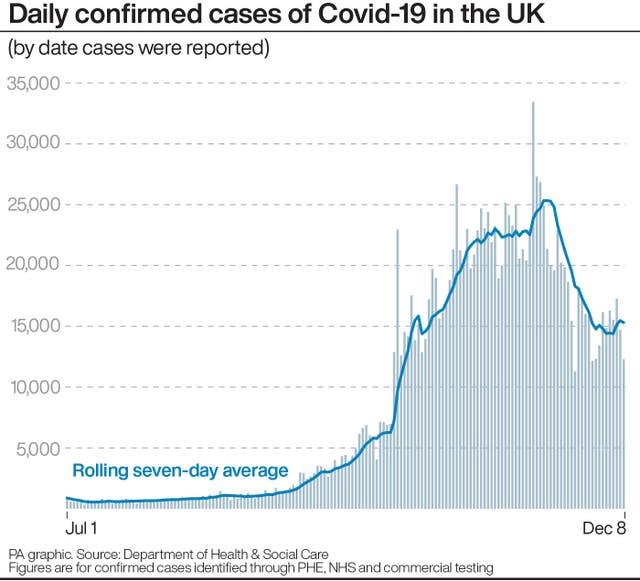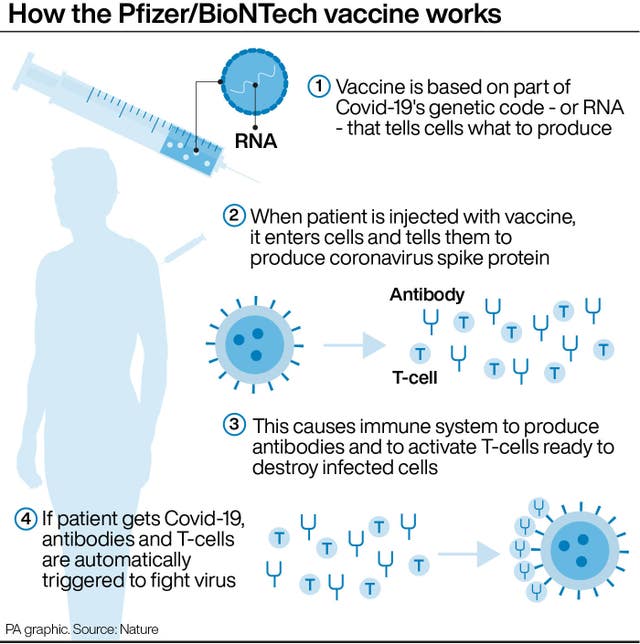
Allergic reactions to vaccines are “not unexpected”, scientists have said as they set to reassure the public over the safety of the new Covid-19 vaccine.
It comes after two NHS staff members who received the jab on Tuesday had allergic reactions after being given the Pfizer/BioNTech vaccine.
The health workers, who are understood to both have a history of severe allergic reactions, were among thousands to receive the vaccine on the first day of the Covid-19 mass vaccination programme.
The Medicines and Healthcare products Regulatory Agency (MHRA) has given precautionary advice to NHS trusts that anyone who has a history of “significant” allergic reactions to medicines, food or vaccines should not receive the vaccine.
The patient safety leaflet for the vaccine cautions that anyone with an allergy to any of the active substances in the vaccine should not receive the jab.
It adds: “Signs of an allergic reaction may include itchy skin rash, shortness of breath and swelling of the face or tongue.”
The NHS in England said all trusts involved with the vaccination programme have been informed.
This means that anyone scheduled to receive the vaccine will be asked about their history of allergic reactions.
Professor Stephen Powis, national medical director for the NHS in England, said: “As is common with new vaccines, the MHRA have advised on a precautionary basis that people with a significant history of allergic reactions do not receive this vaccination after two people with a history of significant allergic reactions responded adversely yesterday.
“Both are recovering well.”
 (PA Graphics)
(PA Graphics)
Pfizer said the vaccine was “well tolerated” during the trials with “no serious safety concerns”.
A spokeswoman said: “We have been advised by MHRA of two yellow card reports that may be associated with allergic reaction due to administration of the Covid-19 BNT162b2 vaccine.
 (PA Graphics)
(PA Graphics)
“As a precautionary measure, the MHRA has issued temporary guidance to the NHS while it conducts an investigation in order to fully understand each case and its causes.
“Pfizer and BioNTech are supporting the MHRA in the investigation.
“In the pivotal phase three clinical trial, this vaccine was generally well tolerated with no serious safety concerns reported by the independent Data Monitoring Committee.
“The trial has enrolled over 44,000 participants to date, over 42,000 of whom have received a second vaccination.”
The yellow card scheme is the UK system for collecting and monitoring information on suspected safety concerns or incidents involving medicines and medical devices.
Commenting on the development, Peter Openshaw, past-president of the British Society for Immunology and professor of experimental medicine at Imperial College London, said: “As with all food and medications, there is a very small chance of an allergic reaction to any vaccine.
“However, it is important that we put this risk in perspective. The occurrence of any allergic reaction was one of the factors monitored in the phase three clinical trial of this Pfizer/BioNTech Covid-19 vaccine, the detailed data from which was released yesterday.
“In this, they reported a very small number of allergic reactions in both the vaccine and placebo groups (0.63% and 0.51%).
“Similar to the rollout of all new vaccines and medications, this new Covid-19 vaccine is being monitored closely by the MHRA.
“They will now investigate these cases in more detail to understand if the allergic reactions were linked to the vaccine or were incidental.
“The fact that we know so soon about these two allergic reactions and that the regulator has acted on this to issue precautionary advice shows that this monitoring system is working well.”
Stephen Evans, professor of pharmacoepidemiology at the London School of Hygiene & Tropical Medicine, said: “Allergic reaction occurs with quite a number of vaccines, and perhaps even more frequently with drugs. So it is not unexpected.
“The Pfizer data showed that about 0.6% of people had some form of allergic reaction in the trial on the vaccine, but about 0.5% on placebo. So there was a genuine excess of allergic reaction but this was small and the true rate is not known, and there is a lot of uncertainty around that estimate.”
He added: “What would be wise, as the MHRA have already advised, would be for anyone who has known severe allergic reaction such that they need to carry an EpiPen, to delay having a vaccination until the reason for the allergic reaction has been clarified.
“For the general population this does not mean that they would need to be anxious about receiving the vaccination. One has to remember that even things like marmite can cause unexpected severe allergic reactions.”
Adam Finn, professor of paediatrics at the University of Bristol, said: “Severe allergic reactions to vaccines are unusual but staff administering vaccines are always trained and equipped to deal with them in the event they occur.
“The report of occurrence of two reactions as reported today will heighten awareness of this possibility among immunising teams and sensible precautions to avoid exposure of those who have had previous severe allergic reactions are being proposed while more experience of using this new vaccine accumulates.”
In a statement, charity Allery UK said: “We understand that the two incidents reported are being urgently and fully investigated by the British Society for Allergy and Clinical Immunology, the MHRA and the NHS.
“We await the outcomes of these investigations and are monitoring this situation closely and working with the BSACI and our clinicians in order to provide more information to our allergic community through our website and other channels.”
Tanya Ednan-Laperouse, of the Natasha Allergy Research Foundation, said: “There are likely to be different vaccines available over the course of the next few months, and researchers, pharmaceutical companies and regulators must work to ensure they are free wherever possible from life-threatening allergens.
“And if, for some reason, they are not free from allergens, then the least we can expect is that it is explicitly said so.”



Why are you making commenting on The Herald only available to subscribers?
It should have been a safe space for informed debate, somewhere for readers to discuss issues around the biggest stories of the day, but all too often the below the line comments on most websites have become bogged down by off-topic discussions and abuse.
heraldscotland.com is tackling this problem by allowing only subscribers to comment.
We are doing this to improve the experience for our loyal readers and we believe it will reduce the ability of trolls and troublemakers, who occasionally find their way onto our site, to abuse our journalists and readers. We also hope it will help the comments section fulfil its promise as a part of Scotland's conversation with itself.
We are lucky at The Herald. We are read by an informed, educated readership who can add their knowledge and insights to our stories.
That is invaluable.
We are making the subscriber-only change to support our valued readers, who tell us they don't want the site cluttered up with irrelevant comments, untruths and abuse.
In the past, the journalist’s job was to collect and distribute information to the audience. Technology means that readers can shape a discussion. We look forward to hearing from you on heraldscotland.com
Comments & Moderation
Readers’ comments: You are personally liable for the content of any comments you upload to this website, so please act responsibly. We do not pre-moderate or monitor readers’ comments appearing on our websites, but we do post-moderate in response to complaints we receive or otherwise when a potential problem comes to our attention. You can make a complaint by using the ‘report this post’ link . We may then apply our discretion under the user terms to amend or delete comments.
Post moderation is undertaken full-time 9am-6pm on weekdays, and on a part-time basis outwith those hours.
Read the rules here